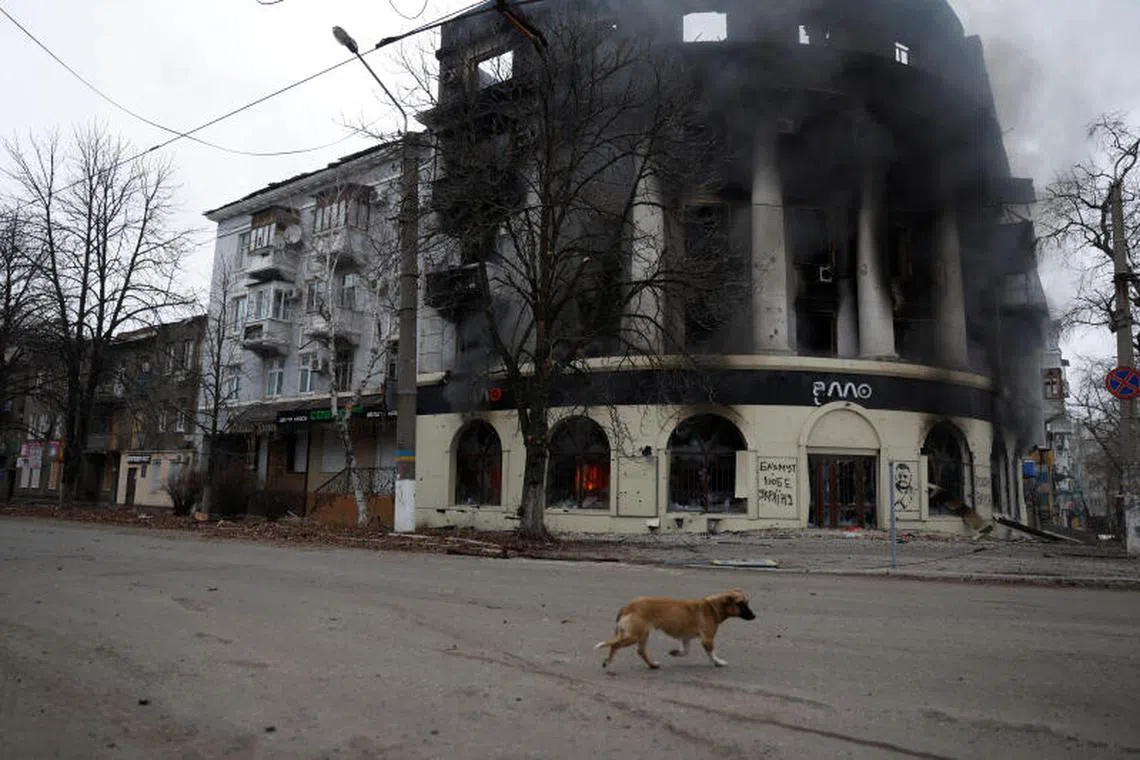Attacks complicate Russia’s campaign of striking Ukraine’s energy grid
Sign up now: Get ST's newsletters delivered to your inbox

Russia has been firing waves of 70 to 75 missiles in intervals of about a week, but the time between strikes has been growing.
PHOTO: REUTERS
KYIV – Ukraine is striking more boldly at targets deep in Russian territory because Kyiv has assessed that Moscow’s military is fighting at the limits of its conventional capabilities, former military officials and analysts say.
So far, the Ukrainian long-range attacks that hit airfields in the heart of Russia, along the Volga River, have not caused extensive damage. The latest, on Monday, killed three service members, said Russia’s Defence Ministry, after air defences shot down a Ukrainian drone approaching Engels air base, near the city of Saratov.
But the attacks, which remain sensitive enough that the Ukrainian government has not publicly acknowledged them, have forced Russia to move planes, potentially complicating Moscow’s campaign of aiming cruise missile strikes at Ukraine’s energy grid.
Since some cruise missiles are launched from bombers that fly from airfields hit in the attacks, the strikes could potentially destroy the missiles on the ground at the Russian airfields before they can be deployed.
With the sense widespread in Kyiv among officials and civilians that – short of nuclear intensification – Russia cannot do much more to Ukraine than it is already doing, the allure of curtailing Moscow’s missile capabilities at home outweighs any escalatory concern.
“If somebody attacks you, you fight back,” said Mr Andriy Zagorodnyuk, a former Ukrainian defence minister who now advises President Volodymyr Zelensky, in an interview in December, after the first Ukrainian long-range strike on Russian military targets hit Engels and another airfields in central Russia.
Mr Zagorodnyuk, clarifying that he did not speak for the government and could not confirm the strikes, added: “You cannot consider, this person will attack you because you are fighting back. There is absolutely no strategic reason not to try to do this.”
Mr Serhiy Hrabskiy, a retired colonel and commentator on the war for Ukrainian news media, said Ukraine’s military has not hesitated to hit airfields, fuel tanks and ammunition depots that are legitimate military targets. Targeting sites in Crimea and cross-border artillery duels have become routine as the war has moved closer to Russia and the occupied peninsula.
“There is no reaction,” Mr Hrabskiy said. “Why? Because the Russians simply do not have the capacity to do so.”
The United States and Ukraine have agreed that Kyiv will not strike targets in Russia with US-provided weaponry.
The Biden administration has vowed to avoid US involvement that could escalate into direct confrontation with Russia. But US officials clarified that they will not object to Ukraine striking back with its own weaponry.
A Ukrainian state-owned military contractor has said it developed a long-range drone that would, theoretically, be able to hit Moscow. Russia said Ukraine used Soviet-era, jet-powered reconnaissance drones to hit air bases on Dec 5.
“We are not working to prevent Ukraine from developing their own capability,” US Defence Secretary Lloyd Austin said after those strikes.
State Department spokesman Ned Price stated only that the US was neither encouraging nor enabling attacks on Russia.
Both the State and Defence departments declined to comment on the reported drone strike on Monday.
Ukraine’s long-range strikes have coincided with a depletion of Russian cruise and tactical ballistic missiles.
After repeated forays against electrical power plants, substations and other infrastructure targets through autumn and early winter, Russia has enough missiles for two or three more waves of strikes on Ukraine’s electrical grid, Mr Kyrylo Budanov, Ukraine’s military intelligence chief, told Ukrainian news outlet Liga.net in an interview published on Monday.
Russia has been firing waves of 70 to 75 missiles in intervals of about a week, but the time between strikes has been growing.
“They will run out,” Mr Budanov said. NYTIMES


